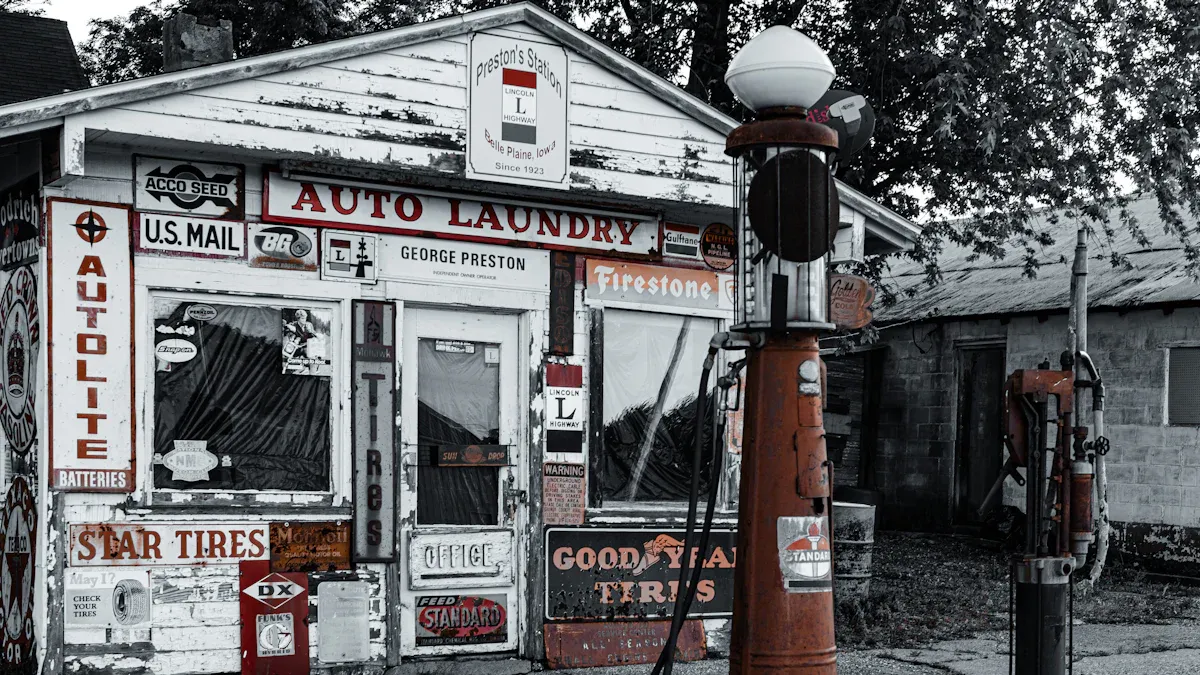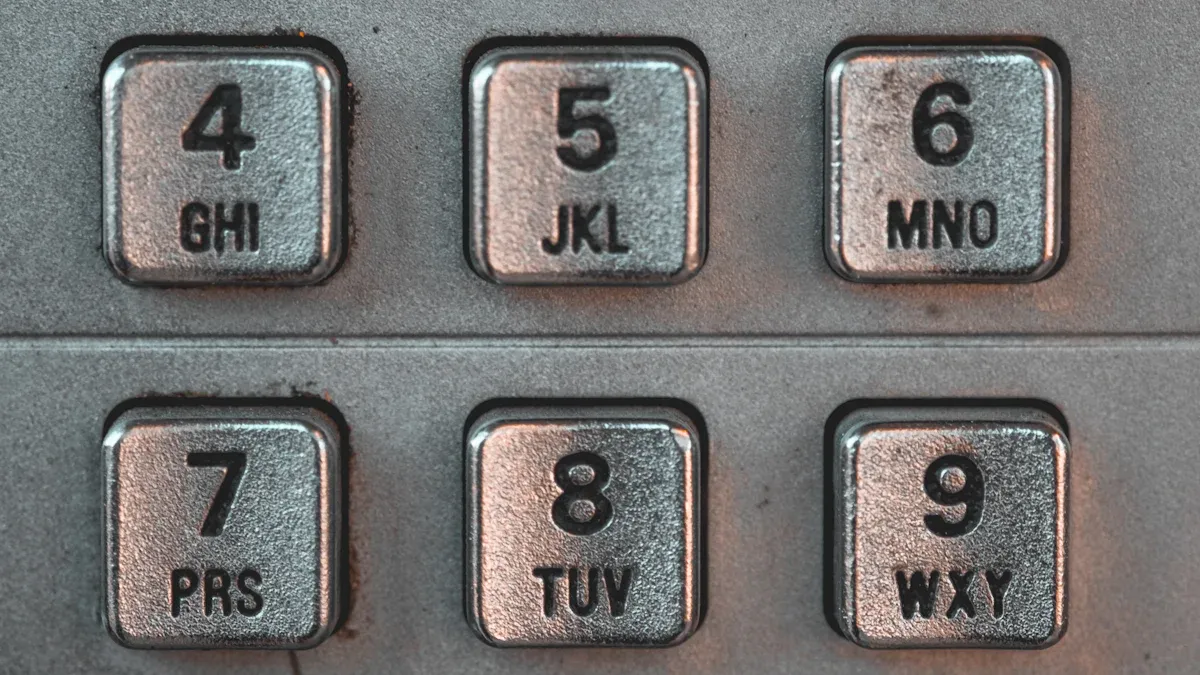
Industrial metal keypad technology helps operators manage equipment in petrochemical environments. These keypads resist damage from weather, dust, and chemicals. Workers depend on them for safe and consistent performance. Many choose an industrial metal keypad for its strength and reliability in areas where safety and durability matter most.
Key Takeaways
- Rugged industrial keypads prevent ignition risks by using explosion-proof designs and durable materials, ensuring safety in flammable petrochemical environments.
- These keypads resist harsh weather, dust, chemicals, and heavy use, providing reliable performance and reducing maintenance needs in fuel dispensers and gas stations.
- Certified keypads with features like corrosion resistance and secure data input improve operational efficiency and protect workers and assets in hazardous locations.
Unique Challenges in Petrochemical and Fuel Dispensing Environments

Flammable Materials and Ignition Risks
Fuel dispensers and petrochemical sites handle liquids and gases that can ignite easily. Several factors increase fire risk in these environments:
- Gasoline stations often have flammable gas concentrations within ignitable ranges.
- Unsafe worker behaviors, such as using electronic devices near fuel dispensers, can trigger ignition.
- Lack of vapor recovery systems allows vapors to build up, raising fire hazards.
- Static electricity forms during the movement, mixing, or pumping of fuels. Sparks from static discharge can ignite vapor-air mixtures.
- Environmental conditions like temperature and humidity affect how static charges accumulate and dissipate.
- Proper grounding, bonding, and regular inspections help reduce these risks.
Note: Ignition can occur when a spark meets an ignitable vapor-air mixture. Operators must control all possible ignition sources to maintain safety.
Environmental Stressors: Weather, Dust, and Corrosive Agents
Outdoor fuel stations and petrochemical facilities expose keypads to harsh elements. Direct sunlight and rain can damage devices and reduce their lifespan. Dust, moisture, and extreme temperatures—both hot and freezing—often cause malfunctions or make keypads hard to use. Devices with an IP65 rating resist water and dust, making them suitable for these tough conditions. Materials like ABS frames and zinc alloy buttons add durability. LED backlighting helps users see the keypad in bright sunlight or at night.
High Traffic, Vandalism, and Heavy Use
Gas stations and petrochemical sites see constant activity. Keypads must withstand frequent use, accidental impacts, and even intentional damage. High traffic increases wear and tear. Vandalism remains a concern in public areas. Durable construction and tamper-resistant features help keypads survive in these demanding settings. Regular maintenance and robust design ensure reliable operation, even under heavy use.
Industrial Metal Keypad Features and Safety Standards
Explosion-Proof and Intrinsically Safe Construction
Industrial metal keypads in petrochemical environments must prevent sparks and withstand hazardous conditions. Manufacturers use advanced materials and construction techniques to achieve explosion-proof and intrinsically safe designs. These keypads often feature stainless steel, titanium, or aluminum bodies. Heavy-duty enclosures and powder-coated surfaces add extra protection. The following table highlights key aspects of explosion-proof construction:
| Aspect | Details |
|---|---|
| Materials | Stainless steel, brushed stainless steel, titanium, aluminum, metal alloys, black titanium, plastic, silicone, composite, alumina |
| Protection Levels | Explosion-proof, IP65, IP66, IP68 waterproof and dustproof ratings |
| Durability Features | Vandal-proof, ultra-rugged, impact-resistant (IK08), scratch-proof, weatherproof, oil-resistant, abrasion-resistant, anti-static, anti-corrosion, chemical-resistant |
| Standards Compliance | MIL-STD 810F, EMC-shielded, ESD protection |
| Construction Methods | Die-cast metal bodies, powder coating with UV stabilized polyester finish, sealing for dust and water resistance, ruggedized design |
| Keypad Features | Stainless steel keys to maintain waterproof and dustproof integrity |
Designers also include magnetic reed switches and noise-canceling microphones for added safety. These features help the keypad operate reliably in explosive atmospheres, such as those found in fuel dispensers and gas stations.
Sealed, Corrosion-Resistant, and Durable Design
A sealed and corrosion-resistant design extends the lifespan of an industrial metal keypad. These keypads must function accurately even when wet or exposed to chemicals. Manufacturers use waterproof cables and connectors to protect the system from water damage. Components resist extreme heat and cold, ensuring reliable operation year-round.
- Stainless steel and other corrosion-resistant materials prevent rust and deterioration.
- Rubber or silicone shields protect buttons from water and dust.
- Moisture-resistant coatings on internal circuits guard against humidity.
- Silicone-based sealants fill gaps and edges, blocking water ingress.
- High IP ratings, such as IP65, IP66, and IP68, confirm dust-tight and waterproof performance.
NEMA enclosures add another layer of protection. They shield electronics from water, chemicals, and salt, and withstand impacts from windborne debris or temperature swings. This rugged construction reduces maintenance costs and prevents premature replacement.
Rugged keypads outperform standard models in salt spray and chemical exposure tests. Devices like the ITT Industries AR4 and AR5 series maintain function after exposure to harsh chemicals and solvents. Protective coatings, O-ring seals, and epoxy sealing provide superior corrosion resistance. These features ensure the keypad continues to work even after years of use in challenging environments.
Compliance with ATEX, IECEx, and UL Certifications
Industrial metal keypads must meet strict safety standards for use in hazardous locations. Certification ensures the keypad will not become an ignition source in explosive atmospheres. The main certifications include ATEX (European Union), IECEx (global), and UL (North America).
- ATEX: Required in the EU. Devices must comply with Essential Health and Safety Requirements and harmonized EN standards. Products display the “Ex” symbol and receive an EC Type Examination Certificate.
- IECEx: Voluntary global certification. Devices must pass standardized testing, quality assessment, and manufacturing audits. Certified products receive a Certificate of Conformity.
- UL (Class/Division system): Used in North America. Recognized labs test and certify equipment for safety in classified hazardous locations.
| Certification | Region / Jurisdiction | Key Requirements | Marking / Certificate | Focus / Purpose |
|---|---|---|---|---|
| ATEX | European Union | Compliance with Essential Health and Safety Requirements (EHSR) and harmonized EN standards; devices must prevent ignition sources under normal and abnormal conditions; mandatory for equipment in explosive atmospheres | Marked with “Ex” symbol; EC Type Examination Certificate issued by Ex Notified Body (ExNB) | Legal requirement ensuring safety and free movement of goods in EU hazardous zones |
| IECEx | Global (voluntary) | Compliance with IEC standards; standardized testing, quality assessment, and manufacturing audits; issuance of Certificate of Conformity (CoC) by accredited IECEx Certification Body | Marked as IECEx certified; Certificate of Conformity (CoC) | Voluntary international certification promoting global trade and consistent safety standards |
| UL (Class/Division) | North America | Testing and certification by recognized laboratories per NEC, CEC, OSHA, NFPA standards; equipment must be safe for classified hazardous locations | Conformity certificate issued by recognized labs | Regulatory framework ensuring equipment safety in North American hazardous locations |
These certifications classify hazardous areas by the likelihood and duration of explosive atmospheres. For example, Zone 0 and Zone 20 represent areas with continuous risk, while Zone 2 and Zone 22 indicate rare or short-term risks. Industrial metal keypads that meet these standards provide peace of mind for operators and facility managers.
Tip: Always verify that a keypad carries the correct certification for the intended environment. This step ensures compliance and protects both personnel and assets.
Real-World Applications and Operational Benefits
Enhancing Safety and Reliability in Fuel Dispensers
Fuel dispensers operate in environments where safety cannot be compromised. Operators rely on rugged keypads to prevent accidents and maintain consistent performance. These devices use explosion-proof construction and durable materials to reduce the risk of ignition in hazardous areas. Stainless steel and reinforced enclosures protect the keypad from impacts, weather, and chemical exposure. This robust design ensures that the keypad continues to function even after years of heavy use. Reliable operation helps workers avoid errors that could lead to spills or fires. Many facilities choose an industrial metal keypad for its proven ability to withstand harsh conditions and support safe fuel dispensing.
Supporting Secure Transactions and Data Input
Security remains a top priority at gas stations and petrochemical sites. Industrial keypads face threats from both physical tampering and cyberattacks. Manufacturers address these risks by integrating advanced security features. Encryption protects data as it moves between devices, while secure authentication verifies the identity of users and systems. Tamper alarms and secure cable routing help prevent unauthorized access. Physical security measures, such as intelligent locks and keys, add another layer of defense. A layered approach combines these physical and digital protections, ensuring that sensitive information stays safe during every transaction. Collaboration between IT and security teams strengthens this defense, making it difficult for attackers to breach the system.
Accurate data input is also essential in high-use environments. The following table highlights how rugged keypads maintain accuracy and reliability:
| Feature/Property | Description/Benefit |
|---|---|
| Chemical Resistance | Protects keypad from corrosive petrochemical substances, preventing damage and errors |
| Shock Resistance | Ensures keypad functionality despite impacts or vibrations in industrial settings |
| Abrasion Resistance | Maintains key legibility and tactile response despite heavy use |
| Waterproof & Dustproof | IP ratings (IP65, IP66, IP67, IP68) prevent ingress of liquids and dust, avoiding malfunction |
| Explosion-Proof Construction | Prevents ignition risks in volatile environments, ensuring safe and reliable input |
| Compliance with Military Standards | MIL-STD 810F, MIL-STD-461G, MIL-STD-810G ensure durability under extreme conditions |
| Durable Materials | Use of stainless steel, aluminum alloys, silicone rubber enhances longevity and reliability |
| Reinforced PCBs & Laser-Engraved Characters | Maintain key functionality and legibility over time, reducing input errors |
| Anti-Corrosion, Anti-Interference, Anti-Static | Ensures stable operation in electrically noisy and corrosive environments |
| Vibration Resistance | Prevents malfunction due to industrial vibrations |
These features help operators enter data quickly and accurately, even in challenging conditions.
Improving Efficiency in Petrochemical Facilities
Petrochemical facilities demand efficient workflows to stay competitive. Rugged industrial devices, including those with physical keypads, streamline daily operations in several ways:
- Workers enter data faster and with fewer mistakes, improving inventory control and compliance reporting.
- Real-time data capture and transmission reduce manual paperwork and speed up safety inspections.
- User-friendly menus and built-in tools, such as barcode and RFID scanners, make asset management easier.
- Devices with GPS and cellular capabilities improve communication and fleet management, supporting better dispatch and coordination.
- Predictive maintenance becomes possible through data collection and analytics, which help reduce equipment downtime and extend asset life.
These improvements lead to safer, more productive workplaces. The adoption of rugged keypads, especially the industrial metal keypad, supports these gains by providing reliable input in every situation.
📈 Industry Insight: The global petrochemical sector expects strong growth in the use of rugged keypads. Drivers include increased automation, stricter safety regulations, and a rising demand for explosion-proof and durable input devices. North America leads the market, but Asia-Pacific is growing quickly. Industry 4.0 and smart manufacturing trends push for more advanced, interconnected keypads with features like programmable keys and ergonomic designs.
Rugged industrial keypads, such as the industrial metal keypad, help prevent ignition of flammable gases in petrochemical sites. These devices meet strict explosion-proof standards, withstand harsh chemicals, and protect workers. Choosing certified keypads reduces downtime, ensures compliance, and supports safe, reliable operations in hazardous environments.
FAQ
What makes a keypad “explosion-proof”?
Explosion-proof keypads use sealed enclosures and non-sparking materials. These features prevent ignition of flammable gases or vapors in hazardous areas.
How do operators clean industrial metal keypads safely?
Operators use non-abrasive cleaners and soft cloths. They avoid harsh chemicals. Regular cleaning maintains keypad performance and prevents buildup of dust or residue.
Why do certifications like ATEX and UL matter?
Certifications show the keypad meets strict safety standards. These approvals help operators trust the device in explosive or hazardous environments.

